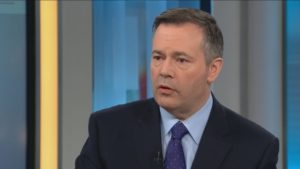Updated 23 December 2021
Hear interview between Bob Ascah and Shaye Ganam here.
Read te 21 December 2021 Edmonton Journal opinion piece by Bob Ascah.
Premier Kenney made some new policy pronouncements about the Alberta government’s liability with respect to public sector pensions at yesterday’s Omicron press conference. His response to a Globe and Mail reporter’s question (minute 47) must be a shock to Finance Minister Toews’ and belies over 20-years of government policy to disengage Alberta taxpayers’ liability from the unfunded liabilities for public sector pensions. If not walked back, it may haave some influence over the province’s credit rating.

James Keller The Globe and Mail. This is going way, way off topic. The Parkland Institute put out a report today on AIMCo with a lot of criticisms about its performance and some of the problems we’ve seen over the past year or more. Among the recommendations is that clients, which are predominantly provincial employee pension plans, be permitted to withdraw from AIMCo with 2 years notice. I’m just wondering what you think about that prospect and whether you think people should have the ability to get their capital out of AIMCo?
Premier Kenney Well I haven’t seen that report, first of all. Secondly, I would, my understanding is, that this year AIMCo has had very strong performance in terms of their investment results and that broadly over the past decade they have performed as well or better than the average amongst comparable public pension fund managers. Thirdly, there are significant savings-economies of scale being realized by AIMCo as a central investment manager for the various public pension funds in the province. This avoids duplicate administration. It also allows the participants to benefit from -with a larger fund- from a more diverse distribution of investments as well as being able to invest in larger-scale projects which may have better returns. So there were many reasons why there are benefits to participating in a larger fund.
At the end of the day what you’re referring to- our public servants, our government employees’ pension plans, which are operated as defined benefit plans which are effectively indemnified by the Crown, by the government, So regardless, this is what I find peculiar, regardless of what the returns are- the beneficiaries will get the same pension based on their defined-benefit formula and if there is under-performance in the investment fund the government, the taxpayer has to cover the difference. I think there is a widespread misconception about this. It seems as though- some- this was certainly the case of the conversion of the Alberta Teachers Retirement Fund -it seems as though some believe that these are defined contribution plans where the benefits are correlated to the investment outcome. That is not true. These are defined- guaranteed- defined-benefit pensions and so the government has an interest in maximizing returns so that we minimize taxpayer risk and we believe the best way of doing so is operating through a larger fund such as AIMCo.
And I can share- with the ATRF for example, we have saved – we estimate – something like 50- million dollars annually in pension administration costs that will benefit teachers – it will be expressed in about $25-million in lower premiums and it will benefit taxpayers by saving about 25-million dollars for the government. So creating all sorts of separate little funds where they have to go out and pay seven figures to fund managers, to compete for world class fund managers, I don’t think this makes a lot of sense in the context of defined benefit publicly guaranteed pensions.
Let’s try to unpack this. What is the nature of the public sector pension bargain?
As the Parkland report makes clear, public pension fund investments are decidedly not public money as the Premier infers. The existing pension bargain requires both employees and employers (including the government directly or through grants to AHS, universities, etc.) to contribute a portion of salaries to fund the retirement plans. Once contributions are taken in and invested they are not public money. The individual fund and its board is tasked with ensuring that there are sufficient moneys available to pay out the agreed benefits. Otherwise, it is the board which will have to make difficult choices about benefit levels and contribution rates- not the government.

Premier Kenney is quite right these plans are defined benefit plans, but I doubt very much that there is a big misconception in the minds of retirees and members that the plans are defined contribution plans. Why the Premier seems to have offered a blank cheque to public sector pensioners and workers is rather curious. Perhaps this is because, in his world view, a paternalistic government still holds legal or other obligations to underwrite losses. Perhaps this is also consistent with his view that public sector workers have something really special which private sector workers don’t have.

Another questionable statement by the Premier came from standard talking points about AIMCo’s recent and decade long investment performance. These claims are in direct conflict with findings in my report (pages 21-26) especially in relation to the ATRF’s performance.
Finance Minister Toews must surely have been surprised on hearing his leader’s creative interpretation of the various legislative, regulatory and contractual pieces of public pension plan bargain. It will be interesting to watch how this unexpected Christmas gift for public sector workers is walked back over the coming weeks, if at all.
It is amusing (and somewhat worrying) that the Premier is actually the one who is confused about the nature of the pension fund obligations. Unless, as you say, he thinks the government has a moral obligation to retirees. It is also intriguing that Kenney decides to respond to that question at length (which, as, a the reporter acknowledges, is way off topic). My understanding is that quite a few of the pension plans (mis-) managed by AIMCO are still underfunded despite the large stock market gains in the last few years. Can we look forward to a huge government bail- out?
Does this indicate hubris?
Good analysis and commentary. I had not appreciated the full implications of the Premier’s comments until reading your blog. This is one of many issues upon which the Premier is sadly misinformed.
Mr, Kenney thinks the pension money is his to spend .